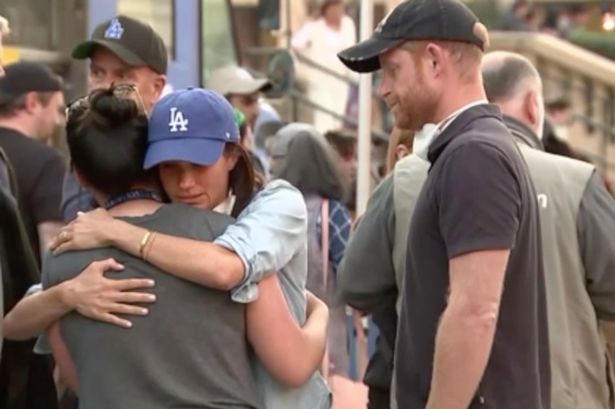The Duke and Duchess of Sussex, Prince Harry and Meghan Markle, recently embarked on a trip to Pasadena, California, purportedly to offer support and aid to residents affected by the devastating wildfires that have ravaged the region. Their visit involved meeting with community members, hearing their stories of loss and resilience, and presumably contributing to relief efforts. While such acts of charity and support are typically met with appreciation, this particular instance has attracted a wave of criticism and skepticism, primarily emanating from online conspiracy theorists. These individuals have cast doubt on the genuine nature of the Sussexes’ visit, suggesting ulterior motives ranging from publicity stunts to political maneuvering, questioning the timing, location, and overall impact of their presence in the fire-stricken area.
The core of the conspiracy theories revolves around the perceived incongruity of the Duke and Duchess’s involvement in a localized disaster relief effort. Critics question why internationally recognized figures would focus on a specific community in California when numerous other disasters and crises demand attention globally. Some suspect the Sussexes are leveraging the tragedy for personal gain, aiming to bolster their public image and garner favorable media coverage. Theories speculate that the choice of Pasadena, a relatively affluent area, indicates a calculated move to appeal to a specific demographic, potentially furthering their ambitions in the entertainment and political spheres. The lack of extensively documented evidence of their direct involvement in tangible aid distribution has also fueled the fire of speculation, leading some to question the actual impact of their visit beyond photo opportunities and brief interactions with residents.
Furthermore, the timing of the visit has drawn significant scrutiny. Occurring amidst ongoing tensions with the Royal Family and a backdrop of legal battles and media controversies, the gesture of support has been interpreted by some as a strategically timed attempt to deflect attention from negative publicity and project an image of compassion and community engagement. Conspiracy theorists highlight the relative silence surrounding other charitable endeavors by the couple, arguing that this particular instance seems unusually public and orchestrated. The rapid dissemination of images and stories related to the visit across social media platforms has further amplified these suspicions, with some suggesting a deliberate public relations campaign is underway to rehabilitate the Sussexes’ image following a series of unfavorable headlines.
The intense online scrutiny has descended into personal attacks against the Duke and Duchess, with some questioning their motivations and even their empathy. Accusations of hypocrisy abound, with critics referencing the couple’s lavish lifestyle and perceived disconnect from the struggles of ordinary people. The use of private jets for travel, while acknowledged to be carbon offset, has been cited as an example of their environmental hypocrisy, given the link between climate change and the increasing frequency and intensity of wildfires. The online attacks often delve into ad hominem territory, targeting Meghan Markle in particular with misogynistic and racially charged rhetoric, exacerbating the already hostile online environment.
The prevalence of these conspiracy theories underscores the growing trend of skepticism and distrust surrounding public figures and their actions, especially within the echo-chamber dynamic of online communities. The ease with which misinformation and speculation can spread through social media platforms creates a breeding ground for conspiracy theories to flourish, often with little regard for factual accuracy or nuanced understanding. While legitimate concerns about transparency and accountability are valid, the rampant spread of unsubstantiated claims and personal attacks serves to undermine genuine efforts to address important issues like disaster relief and community support. This case highlights the increasingly challenging landscape for public figures navigating the complexities of public perception in the digital age.
The situation illuminates the broader issue of the erosion of trust in institutions and individuals, fueled in part by a polarized media landscape and the proliferation of misinformation. While holding public figures accountable is crucial, the relentless pursuit of conspiracy theories often overshadows genuine efforts to make a positive impact. The Sussexes’ visit to Pasadena, regardless of their motivations, aimed to bring attention and support to a community in need. The unfortunate consequence of the online backlash is the diversion of focus from the actual victims of the wildfires and the ongoing efforts to rebuild and recover. The corrosive effect of conspiracy theories not only damages the reputations of individuals but also erodes the fabric of civil discourse and the ability to engage constructively on important societal issues.














